Symposium 1: Clashes of Knowledge
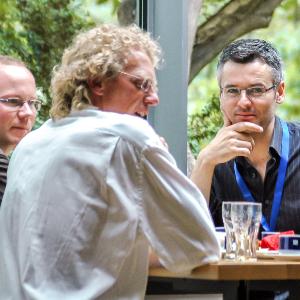
© Knowledge and Space
Was ist Wissen – und wo verlaufen seine Grenzen? Clashes of Knowledge widmet sich den Ursprüngen, Formen und Konflikten von Wissen in kulturellen, sozialen und wissenschaftlichen Kontexten. Das Symposium rückt die Entwicklung wissenschaftlichen Wissens, seine Geltungskriterien und seine Grenzen in den Mittelpunkt sowie sein Spannungsverhältnis zu Religion und Ethik. Historisch wird nachvollzogen, wie wissenschaftliche Rationalität religiöse Wissensformen zurückdrängte und wie Wissenschaft, Religion und Gnosis als zentrale Strömungen europäischer Kulturgeschichte miteinander verflochten waren. Ein weiterer Schwerpunkt liegt auf kognitiver Dissonanz und den sozialen Mechanismen, durch die widersprüchliche Informationen ausgeblendet werden. Soziale Normen, kultureller Druck und institutionelle Erwartungen prägen, was als gültiges Wissen akzeptiert wird.
Symposium 2: Milieus of Creativity
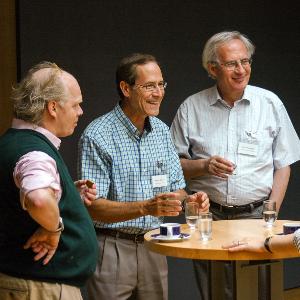
© Knowlede and Space
Milieus of Creativity untersucht die kulturellen, psychologischen und sozialen Grundlagen kreativen Denkens und zeigt, wie kreative Leistungen aus einem Zusammenspiel individueller Dispositionen und sozio-räumlicher Bedingungen hervorgehen. Der Fokus liegt auf der Verbindung von Kreativität und Problemlösung, den affektiven und motivationalen Faktoren kreativer Prozesse sowie den Unterschieden kreativer Fähigkeiten in verschiedenen sozialen Kontexten. Das Symposium beleuchtet die Rolle kreativer Milieus in regionalen Wissensökonomien und zeigt, wie Wissen in wirtschaftlichen Strukturen verarbeitet und produktiv gemacht wird. Auch für wissenschaftliche Durchbrüche erweist sich Kreativität als zentrales Element: Sie entsteht dort, wo institutionelle Rahmenbedingungen und forschungsnahe Umgebungen neue Denkwege begünstigen.
Symposium 3: Geographies of Science
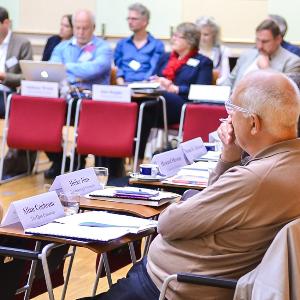
© Knowledge and Space
Geographies of Science untersucht, wie wissenschaftliche Erkenntnisse in räumlichen und lokalen Kontexten entstehen und warum Forschung nie ortslos ist. Wissenschaftliche Innovationen ergeben sich aus spezifischen Bedingungen: der Qualität vorhandener Infrastrukturen, etablierten Forschungsstilen, regionalen Netzwerken und politischen wie kulturellen Rahmenlagen. Im Zentrum steht die räumliche Organisation wissenschaftlicher Arbeit. Die Architektur von Laboren, Museen und Fakultäten beeinflusst kreative Prozesse ebenso wie informelle Netzwerke, räumliche Anordnungen von Menschen und Geräten oder lokale Praktiken des Austauschs. Sichtbar wird, wie stark Orte die Form, Zirkulation und Anerkennung von Wissen prägen. Das Symposium zeigt, dass wissenschaftliche Produktion und Nutzung immer an räumliche Settings gebunden sind.
Symposium 4: Cultural Memories
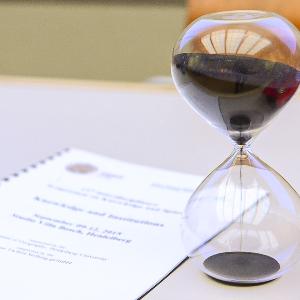
© Knowledge and Space
Wie entsteht Wissen aus Erinnerung ? Im Zentrum von Cultural Memories stehen kognitive Mechanismen der Speicherung und Rekonstruktion sowie die Übertragung von Wissen zwischen Menschen, gestützt durch Erkenntnisse aus Psychologie und Hirnforschung. Das Symposium betrachtet individuelle und kollektive Erinnerung als dynamische Prozesse, die durch räumliche und kulturelle Kontexte geprägt werden und sich über spezifische semiotische Codes ausdrücken. Museen, Denkmäler und Gedenkstätten fungieren dabei als räumliche Speicherorte kulturellen Wissens, die Erinnerungen konservieren, auslösen und gesellschaftlich verankern. Zudem wird sichtbar, wie kulturelle Erinnerungen bewahrt, geformt oder transformiert werden – etwa durch politische Rahmungen, soziale Praktiken oder Veränderungen im kollektiven Selbstverständnis.
Symposium 5: Knowledge and Economy
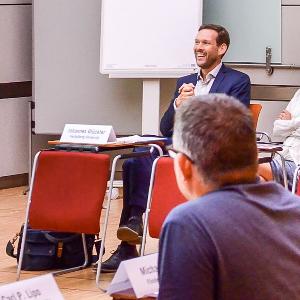
© Knowledge and Space
Knowledge and Economy untersucht, unter welchen Bedingungen Wissen ökonomischen Wert erhält und welche gesellschaftlichen Folgen daraus entstehen. Im Mittelpunkt steht die Unterscheidung zwischen Wissen, das marktfähig wird, und jenem, das trotz gesellschaftlicher Relevanz wirtschaftlich nicht verwertet wird. Besondere Aufmerksamkeit gilt der räumlichen Dimension technologischer Entwicklungen. Wissen, Innovationen und neue Technologien prägen die Wettbewerbsfähigkeit von Regionen, beeinflussen wirtschaftliche Dynamiken und erzeugen deutliche Unterschiede in der regionalen Innovationskraft. Messbare Faktoren wie Infrastruktur, Netzwerke oder institutionelle Rahmenbedingungen bestimmen diese Divergenzen. Das Symposium zeigt, wie komplex die Rolle von Wissen in wirtschaftlichen Prozessen tatsächlich ist.
Symposium 6: Learning Organizations
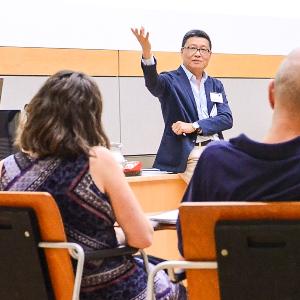
© Knowledge and Space
Wie nutzen, speichern und entwickeln Organisationen Wissen, und wie prägen räumliche, strukturelle und soziale Bedingungen diese Prozesse? Im Mittelpunkt von Learning Organizations steht die Frage, wo spezialisiertes Wissen innerhalb einer Organisation am wirksamsten angesiedelt ist, abhängig von Zielen, Unsicherheiten im Umfeld und internen Strukturen. Das Symposium beleuchtet die psychologischen, soziologischen und geografischen Grundlagen organisationalen Lernens. Es zeigt, wie Organisationen aus Erfolgen und Fehlern lernen, wie sie Impulse aus ihrem räumlichen Umfeld aufnehmen und wie der Vergleich mit Mitbewerbern Lernprozesse anstößt. Faktoren wie institutionelle Routinen, Machtverhältnisse, Netzwerkstrukturen oder interne Konflikte können diese Dynamik fördern oder hemmen.
Symposium 7: Knowledge and Power
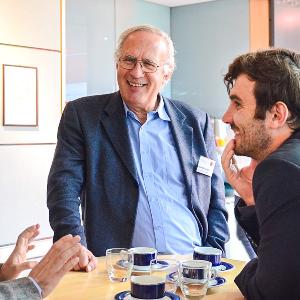
© Knowledge and Space
Knowledge and Power analysiert, wie unterschiedliche Wissensformen Macht begründen, sichern und legitimieren. Im Zentrum steht die Verzahnung von Wissen und Herrschaft, sichtbar in historischen und gegenwärtigen Formen der Instrumentalisierung wissenschaftlicher Autorität. Das Symposium zeigt, wie Wissen als Ressource politisch eingesetzt wurde - bis hin zu vermeintlichen „Heilsversprechen“, die gesellschaftliche Erwartungen steuerten. Ein Schwerpunkt liegt auf Mechanismen der Kontrolle und Manipulation: Zensur, mediale Allianzen oder strategisch platzierte Informationsflüsse prägen, was öffentlich sichtbar wird und welche Stimmen Gehör finden. Ebenso rückt die Konstruktion kollektiver Identitäten in den Fokus. Archive, Geschichtspolitik und kulturelle Narrative formen gesellschaftliche Selbstbilder und definieren, welche Vergangenheit anerkannt oder verdrängt wird.
Symposium 8: Ethnic and Cultural Dimensions of Knowledge

© Knowledge and Space
Kulturelle Identität, Bildung und Wissen sind eng miteinander verwoben. Ethnic and Cultural Dimensions of Knowledge beleuchtet, wie Bildungssysteme die Entwicklung kultureller Identitäten beeinflussen und gleichzeitig zur Integration, Assimilation oder Marginalisierung von Minderheiten beitragen. Auch die gezielte Zerstörung von Wissen wird thematisiert. Im Zentrum steht die Vielfalt von Wissensbegriffen: Unterschiedliche Kulturen verfügen über eigene Traditionen der Wissensproduktion und -bewertung. Indigenes Wissen nimmt dabei eine ebenso zentrale Rolle ein wie die Frage, wie westliches Wissenschaftsverständnis weltweit übernommen oder abgelehnt wurde. Darüber hinaus beschäftigt sich das Symposium mit den räumlichen und sozialen Ungleichheiten in der Verbreitung von Bildung und digitaler Kompetenz.
Symposium 9: Knowledge and Action

© Knowledge and Space
Wissen gilt als Grundlage für zielgerichtetes Handeln, doch die Verbindung zwischen Erkenntnis und Aktion ist komplex. Knowledge and Action widmet sich den Zusammenhängen von Wissen, Handlungsfähigkeit und Rationalität. Im Fokus steht das Zusammenspiel verschiedener Wissensformen mit kognitiven und emotionalen Prozessen, die Handeln prägen. Routinen, Erfahrungen, Intuition oder formales Wissen beeinflussen Entscheidungen ebenso wie soziale Normen oder situative Wahrnehmungen. Auch die Frage nach unterschiedlichen Rationalitätskonzepten wird beleuchtet. Während klassische Theorien oft von rein zweckrationalem Handeln ausgehen, berücksichtigt das Symposium Ansätze, die Alltagshandeln, begrenzte Rationalität und symbolische Deutungsmuster einbinden. Darüber hinaus werden aktuelle Perspektiven der Handlungstheorie diskutiert. Die Bandbreite reicht von subjektzentrierten über symbolische Ansätze bis hin zur Frage, wie Wissen überhaupt Handlungsoptionen schafft oder begrenzt.
Symposium 10: Spatial Mobility of Knowledge
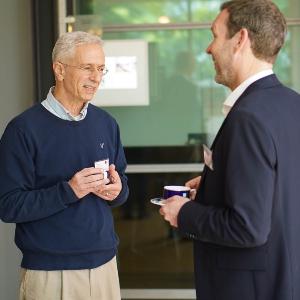
© Knowledge and Space
Die räumliche Mobilität von Wissen und Wissensnetzwerken ist ein zentrales Merkmal der globalen Wissensgesellschaft. Spatial Mobilities of Knowledge untersucht, wie Wissen, Ideen und Fachkräfte über Zeit und Raum zirkulieren. Reisen, Migration und internationale Kooperationen gelten als wesentliche Treiber von Wissensproduktion und Innovation. Gleichzeitig verändern sich Inhalte, Bedeutungen und Anwendungsformen von Wissen durch diese Mobilitätsprozesse. Nicht alle Wissensarten verbreiten sich dabei gleich erfolgreich: kulturelle, soziale, politische und ökonomische Faktoren wirken als Filter oder Verstärker. Auch die Rolle von Migranten, Expats oder mobilen Experten für den globalen Wissensaustausch wird beleuchtet. Ihre Bewegungen beeinflussen nicht nur die Struktur internationaler Netzwerke, sondern auch die Entwicklung von Innovationszentren und Wissensökonomien.
